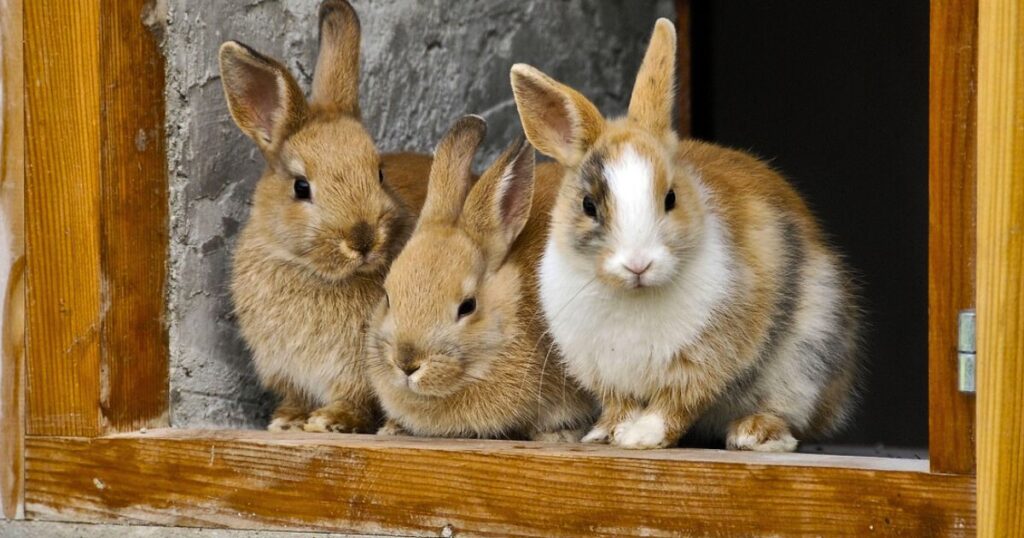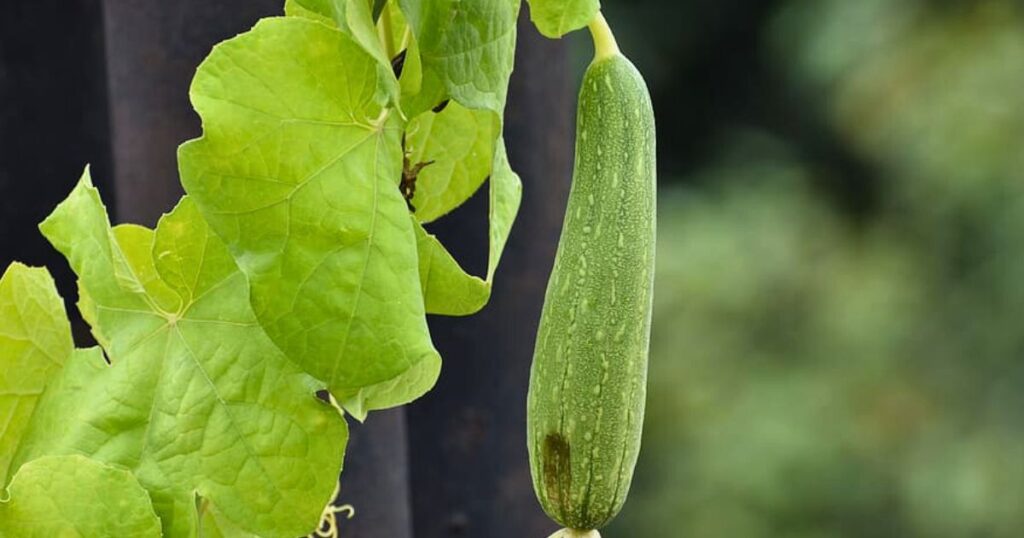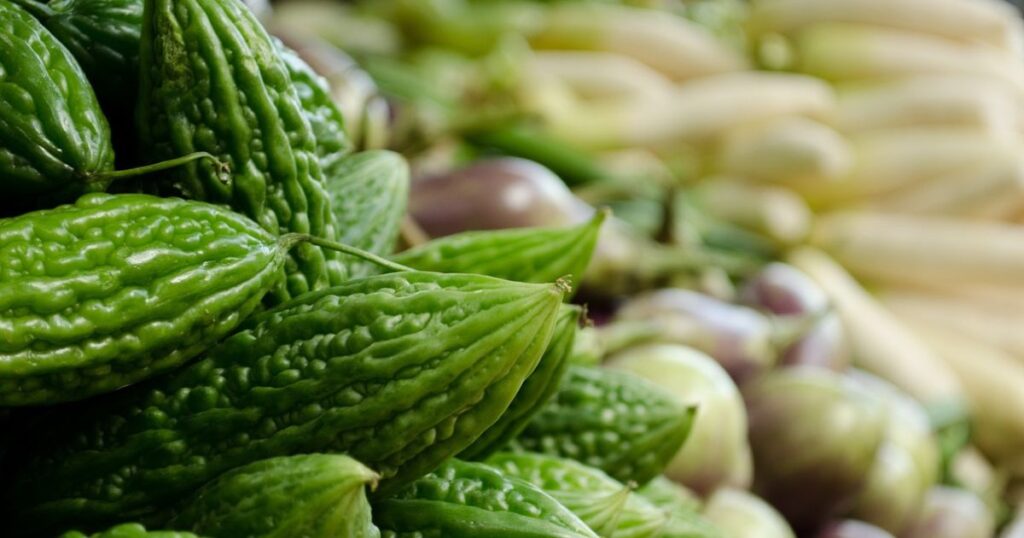
A gourd is a type of fruit belonging to the Cucurbitaceae family, which includes various plants like pumpkins, squash, and cucumbers. Gourds typically have hard, durable shells and are often used for decorative purposes or to make containers, utensils, and musical instruments.
But can rabbits eat them too?
In short, yes, rabbits can eat certain types of gourds in moderation. It is essential to feed them only the edible varieties, as some gourds can be toxic to rabbits. Zucchini and other summer squash are safe for rabbits.
But bitter and decorative gourds are a no-no for rabbits.
So, should you feed guard to your rabbits?
Let’s find out!
Table of Contents
Can Rabbits Eat Gourds?
Well, it depends on the type of gourd.
Rabbits are herbivores, which means they eat plants and vegetables, but not all plants are safe for them.
Some gourds, like zucchini and cucumber, are safe for rabbits to eat. These gourds are full of water and nutrients, which can be good for your bunny’s health.
They can munch on them as part of their balanced diet.
But there are other gourds, like bitter melon and decorative gourds, that are NOT safe for rabbits. These gourds may contain substances that could make your bunny sick.
So, the key is to make sure you know exactly what type of gourd you have and if it’s safe for your rabbit to eat.
How Much Gourd Can I Give My Rabbits?
Since rabbits are small and have sensitive tummies, it’s best to give them a small amount of gourd at first.
Maybe start with just a tiny piece and watch how your bunny reacts to it.

If they eat it happily and don’t show any signs of tummy trouble, then that’s a good sign!
If everything goes well and your bunny seems fine, you can give them a bit more gourd the next time. But still, keep the pieces small, maybe you can increase them in later days, but for now, that’s enough!
Remember, gourd is just one part of your bunny’s diet. They need a variety of veggies and hay to stay healthy.
So, don’t give them too much gourd all at once.
Just a little bit as a treat is perfect!
Also Read: Can Rabbits Eat Hibiscus Flowers?
Potential Health Benefits of Gourds For Rabbits
Gourds can provide several health benefits for rabbits when given in moderation.
A typical serving of gourd (100g) contains:
- Calories: 16 kcal
- Carbohydrates: 3.1 grams
- Fiber: 1.0 gram
- Sugars: 2.5 grams
- Protein: 1.2 grams
- Fat: 0.2 grams
Other health benefits of gourd may include:
Hydration
Gourds have a high water content, which helps keep rabbits hydrated, especially during hot weather.
Proper hydration is essential for maintaining overall health and preventing issues like urinary problems.
Maintains weight:
Gourds are relatively low in calories, making them a great option for rabbits who need to manage their weight. They can enjoy these treats without worrying too much about excessive calorie intake.
Rich in nutrients
Gourds contain essential vitamins and minerals that contribute to a rabbit’s overall well-being. These nutrients include vitamin C, vitamin K, potassium, and manganese.
Rich source of fiber
Gourds are a good source of dietary fiber, which is crucial for a healthy digestive system in rabbits. Fiber aids in promoting proper gut motility and can help prevent issues like GI stasis.
Remember, while gourds offer health benefits, they should be offered in moderation!
Risks of Overfeeding Gourds to Rabbits
Overfeeding gourds to rabbits can pose several risks to their health.
While gourds are generally safe for rabbits when given in moderation, excessive consumption can lead to various issues.
Here are the risks of overfeeding gourds to rabbits:
Digestive Problems
Gourds are high in fiber, and if rabbits eat too much of them, it can lead to digestive problems like diarrhea or bloating.
Rabbits have sensitive digestive systems, and sudden changes in their diet can upset their delicate balance.
Weight Gain
Gourds, especially those with higher sugar content like pumpkin, can be calorie-dense.
Overfeeding them can lead to weight gain, which can be harmful to your rabbit’s health, causing problems like obesity and putting extra stress on their joints.
Dental Problems
Gourds have a softer texture compared to hay, which may not provide enough wear on rabbits’ teeth.
Insufficient wear can lead to overgrown teeth, which can cause pain and difficulty eating.
Increased Thirst
Some gourds, like cucumber, have high water content.
Overfeeding such gourds can increase a rabbit’s water intake, which may lead to more frequent urination.
However, you can prevent these risks by offering gourd in moderation.
Can Rabbits Eat Gourd Leaves?

Well, it depends on the type of gourd.
Some gourd leaves are safe for rabbits to eat, while others are not.
Rabbits love munching on some types of gourd leaves, like pumpkin leaves! They are yummy and full of good stuff for bunnies. If you have a pumpkin plant and want to share some leaves with your bunny, go ahead!
But there are some gourd leaves that can be harmful to rabbits. For example, bitter melon leaves should be avoided because they can make your bunny sick.
Cooked vs. Raw Gourds for Rabbits
Now, you know that there are some types of gourd that can be given to rabbits, but you may wonder whether you should offer it raw or cook it.
It’s simple!
For example,
Raw Gourds:
Rabbits can eat some types of raw gourds, like zucchini and cucumber. Raw gourds are packed with nutrients and water, which is great for your bunny’s health.
They enjoy the fresh, crunchy texture, and it can be a healthy treat for them.
Cooked Gourds:
While rabbits can eat some raw gourds, it’s best to avoid giving them cooked gourds. When you cook gourds, they may change in texture and taste, and some cooking methods might add seasonings or oils that aren’t good for your bunny’s tummy.
Rabbits are sensitive to certain foods, so it’s safer to stick with raw gourds instead.
Remember, moderation is key!
Whether it’s raw or cooked, always offer gourds in small amounts and watch how your bunny reacts to it.
If they seem to enjoy it and don’t have any tummy issues, you can continue to give them small portions as a treat.
Types of Gourds That Are Safe for Rabbits
Rabbits can safely eat certain types of gourds that are nutritious and healthy for them.
Here are some safe gourds for rabbits:
- Zucchini (Courgette): Zucchini is one of the safest and most popular gourds for rabbits. It’s low in calories, high in water content, and packed with essential nutrients like vitamin C and potassium.
- Cucumber: Cucumber is another safe and refreshing gourd for rabbits. It’s mostly water, making it hydrating for bunnies, and it provides some vitamins and minerals.
- Pumpkin (including Pumpkin Leaves): Pumpkin is safe for rabbits to eat, and they can also enjoy the tender leaves from pumpkin plants as an occasional treat.
These gourds are well-tolerated by rabbits and can be a healthy addition to their diet when given in moderation.
Remember that the safety of gourds may vary depending on your location and the specific type of gourd you have, so always double-check before offering any new food to your bunny.
Are There Any Gourds that Rabbits Should Avoid?
Yes, there are gourds that rabbits should avoid. Some gourds can be harmful to rabbits and may cause health issues if ingested.
Here are a few gourds that are not safe for rabbits:
Bitter Melon (Momordica charantia):
Bitter melon contains substances that can be toxic to rabbits. It’s best to avoid giving bitter melon or any parts of this gourd to your bunny.
Decorative Gourds:
Some gourds are grown for decorative purposes and are not meant to be eaten. These gourds are usually treated with chemicals or pesticides, making them unsafe for rabbits.
Ornamental Gourds:
Similar to decorative gourds, ornamental gourds are grown for their appearance and are not suitable for consumption.
Snake Gourd (Trichosanthes cucumerina):
This type of gourd is not safe for rabbits, and it’s best to avoid offering it to them.
It’s crucial to know the specific type of gourd you have and whether it is safe for rabbits before offering it as food.
So, it’s best to stick to their regular veggies rather than experimenting. But if you want to feed something new to your rabbits, make sure you consult a vet or diet expert.
Can Rabbits Eat Bittergourd?

No, rabbits should not eat bitter gourd (bitter melon or Momordica charantia).
Bitter gourd is not safe for rabbits and can be harmful to them.
Bitter gourd contains certain compounds and substances that can be toxic to rabbits when ingested. These substances can cause digestive issues and other health problems in rabbits.
Thus, it’s important to feed things that are safe for rabbits and avoid giving them bitter gourd or any parts of this plant.
How to Prepare Gourds for Rabbit?
Preparing gourd for little bunny is a simple and easy process:
Here’s how you can do it!
- Wash the Gourd First, make sure you have a fresh gourd. It could be zucchini, cucumber, or any safe gourd for rabbits. Rinse it well under cool water to clean off any dirt or chemicals.
- You cut the gourd into small, bunny-friendly pieces. You can cut it into tiny slices or small cubes. Remember, bunnies have small tummies, so smaller pieces are easier for them to eat.
- Offer as a Treat Now, you can offer the gourd pieces to your bunny as a treat! Start with a small piece to see if your bunny likes it. If they do, you can give them a bit more later on, but still, keep the pieces small.
- Observe Your Bunny Watch how your bunny reacts to the gourd. If they happily munch on it and don’t show any signs of tummy trouble, it means they enjoy it!
And that’s it!
Offering gourds to your bunny is a fun way to treat them with something tasty and nutritious. Just be sure to feed them the right type of gourd and cut it into small, safe pieces.
If they don’t finish the gourd pieces you gave them, remove any leftovers after a few hours to keep their food fresh.
Remember, variety is the key!
Other Alternative Veggies for Your Rabbits
There are many alternative veggies that rabbits can enjoy as part of their diet.
Feeding your bunny a variety of vegetables ensures they get different nutrients and keeps their meals interesting!
Here are some safe and yummy options for your furry friend:
- Carrots: Rabbits love carrots! They’re crunchy and sweet, but remember to give them in moderation because they contain natural sugars.
- Leafy greens: Rabbits adore leafy greens like kale, spinach, romaine lettuce, and bok choy. These are excellent sources of vitamins and minerals.
- Bell peppers: Colorful bell peppers are not only tasty but also provide vitamin C for your bunny’s health.
- Broccoli: This green veggie is packed with nutrients and adds some variety to your rabbit’s diet.
- Parsley and cilantro: These herbs make excellent treats and add some flavor to your bunny’s meals.
- Brussels sprouts: another veggie that your bunny might enjoy in small amounts. It’s nutritious and fun for them to munch on.
- Celery: Some rabbits like celery for its crunchy texture, but remember to remove any strings before offering it to them.
- Radishes: These can be given occasionally, and rabbits usually enjoy the peppery taste.
Remember, it’s essential to introduce new veggies slowly and in small amounts to ensure your bunny tolerates them well.
Avoid giving them foods that are high in sugar or fat, like potatoes, as well as any plants that are toxic to rabbits, such as onions, garlic, rhubarb, and houseplants like lilies.
Every bunny is different, so observe how your rabbit reacts to each vegetable and adjust their diet accordingly.
Final Thoughts
Let’s wrap this up!
While rabbits can consume certain types of gourds, it’s essential to exercise caution and moderation.
Gourds like zucchini and other summer squash are safe for rabbits to eat as occasional treats, providing a bit of variety to their diet.
However, it’s crucial to avoid feeding them any toxic or unidentifiable gourds, as some varieties can be harmful or even fatal to rabbits.
Before you leave, here are more helpful articles:
